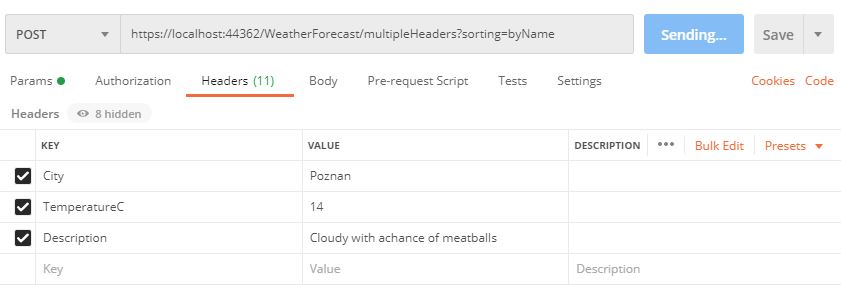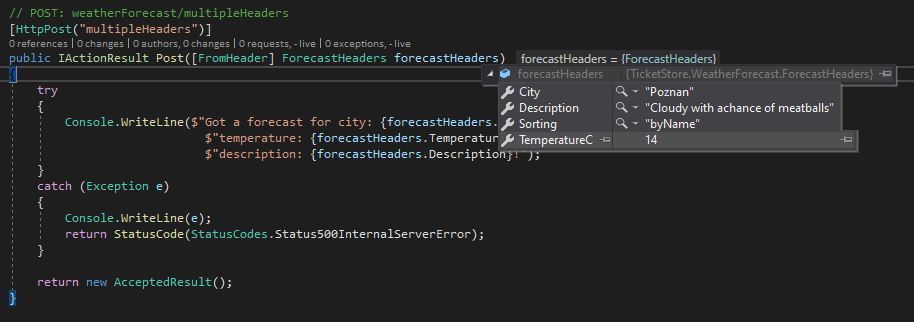Reading headers is a standard operation in ASP.NET Core and has been around for ages. I even wrote a post summarizing all methods of passing parameters: ASP.NET Core in .NET 5 – pass parameters to actions. ASP.NET Core introduced handy attributes to handle parameters in controller methods, like [FromQuery] or [FromHeader]. But is there a way to use those attributes and read headers as a custom object? Let’s see.
This is how a standard controller method looks like.
// POST: weatherForecast/
[HttpPost]
public IActionResult Post([FromBody] WeatherForecast forecast, [FromHeader] string parentRequestId)
{
try
{
Console.WriteLine($"Got a forecast for data: {forecast.Date} with parentRequestId: {parentRequestId}!");
}
catch (Exception e)
{
Console.WriteLine(e);
return StatusCode(StatusCodes.Status500InternalServerError);
}
return new AcceptedResult();
}
In this example [FromBody] means that forecast will be mapped into an object from the request body, and [FromHeader] means that parentRequestId will be taken from the header. That works great, but how to map more headers, preferrable as a separate object?
Let’s take a look at this code:
// POST: weatherForecast/multipleHeaders
[HttpPost("multipleHeaders")]
public IActionResult Post([FromHeader] ForecastHeaders forecastHeaders)
{
try
{
Console.WriteLine($"Got a forecast for city: {forecastHeaders.City}," +
$"temperature: {forecastHeaders.TemperatureC} and" +
$"description: {forecastHeaders.Description}!");
}
catch (Exception e)
{
Console.WriteLine(e);
return StatusCode(StatusCodes.Status500InternalServerError);
}
return new AcceptedResult();
}
And ForecastHeaders looks like this:
public class ForecastHeaders
{
[FromHeader]
public string City { get; set; }
[FromHeader]
public int TemperatureC { get; set; }
[FromHeader]
public string Description { get; set; }
[FromQuery]
public string Sorting { get; set; }
}
Have you noticed, that I used [FromHeader] in both controller method parameter declaration and inside my custom class?
Now let’s make a request with Postman.

And result? Are you surprised as I was? 😀

It worked!
All headers were mapped correctly, as a custom object. Notice that Sorting was also mapped, even if it comes from the query parameter, not the header. It proves you can combine those two if that makes sense.
All of it is available in my GitHub – check it out.
I’m not sure if it’s a bug or a feature… but I like it! ❤️

As always, awesome! Thanks for these ASP.NET Core posts!
This is cool but what about swagger? Have you checked how it renders headers? I’ve been there before it tells you headers are an object instead of headers one for each header field
Thank you, it’s genius!
I was looking for a while on how to easily read the headers and couldn’t find anything.
Thanks! Super easy, super clear.